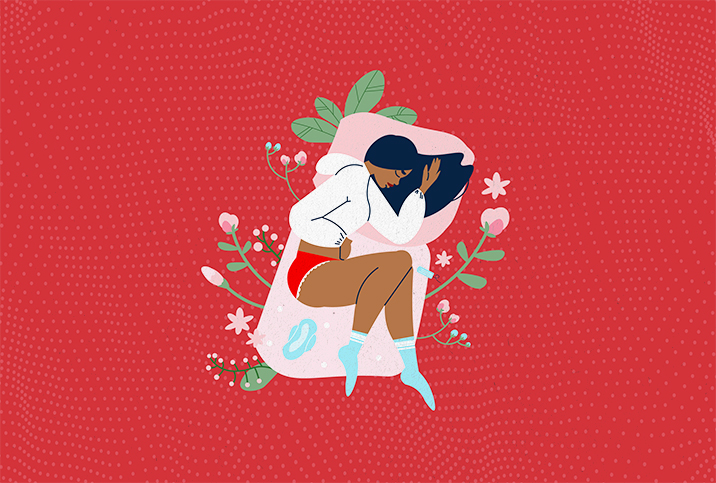What Do You Know About Postmenstrual Syndrome?

So your period is over and you think you're free from premenstrual syndrome (PMS), or the hellish emotions and cramps it brings—but you're not. You feel teary, moody and achy. The brain fog hasn't dissipated. The relief doesn't come, and it's (understandably) upsetting and confusing.
If this is the case, you may be experiencing postmenstrual syndrome. Yep, it's a thing and similar to premenstrual syndrome (and not to be confused with premenstrual dysphoric disorder, or PMDD, a severe form of PMS).
What is postmenstrual syndrome?
You probably haven't heard much about postmenstrual syndrome, but don't let that fool you.
"It is not a clinically recognized condition, per se, but can manifest as both somatic and emotional symptoms that some people experience after their menstrual cycle," said Laurence Orbuch, M.D., an OB-GYN, endometriosis surgeon and director of GYN Laparoscopic/Robotic Associates LA in Beverly Hills, California.
In fact, many Reddit users have shared their experiences with the syndrome, asking if others feel depressed, achy and anxious in the days after their period, too.
You may notice a variety of symptoms in your body and mind after that time of the month.
"Physical symptoms include cramping, achy joints, headaches and pain during sex, as well as burning, itching, dryness and irritation in the vagina during sex and also not during sex," said Alexandra Stockwell, M.D., the host of "The Intimate Marriage Podcast" in California. "Emotional/psychological symptoms include anxiety, sadness, anger and mood swings, as well as difficulty concentrating or falling asleep."
There's little research on the condition and postmenstrual syndrome causes, but doctors have a guess.
"While it hasn't been adequately studied, it is most likely that the same hormonal imbalances that cause premenstrual syndrome are responsible for postmenstrual syndrome," Stockwell said.
"It is frequently more prevalent if one experiences premenstrual syndrome," Orbuch added.
However, PMS is much more common. Nicole Jardim, a certified women's health coach in Connecticut and the creator of the Fix Your Period program, notes on her website that about 90 percent of people with periods experience PMS, whereas around 10 percent of her clients report postmenstrual symptoms.
So how long does postmenstrual syndrome last? It can last for a few days, but the length of time varies.
"It appears that symptoms last anywhere from two to 14 days, with more women experiencing symptoms for a shorter time," Stockwell said.
How can you relieve postmenstrual symptoms?
Since postmenstrual syndrome likely has the same cause (and symptoms) as premenstrual syndrome, should you treat it the same way? These doctors say yes.
"The best way to deal with the symptoms is by preventing them through the choices that make for good health, generally including eating minimal processed food, getting adequate sleep and exercise, and keeping stress to a minimum through avoiding stressors and incorporating stress-reduction techniques, such as yoga and meditation," Stockwell recommended.
(And remember, you don't have to be perfect. We won't judge if you take a moment to lie in bed with Reese's cups.)
For the physical side, Stockwell mentioned pain relief medication, applying heat to the cramping areas and considering oral contraceptives.
Orbuch said talking to your doctor is best, especially if you need prescription medication, such as an antidepressant or anxiolytic medication (the latter is for anxiety).
The bottom line
While there isn't a cure, per se, you can manage—and possibly even prevent—your symptoms through prescribed medication and general self-care practices. That's just another reminder to all of us that self-care can extend beyond a shopping trip or a delicious cake. Speak with your doctor if your postmenstrual symptoms are getting out of hand.
Do you need to find a doctor? Giddy Telehealth takes the difficulty out of such a search, providing access to hundreds of healthcare professionals who offer video visits as a regular part of their practices. Many offer same-day appointments.


















